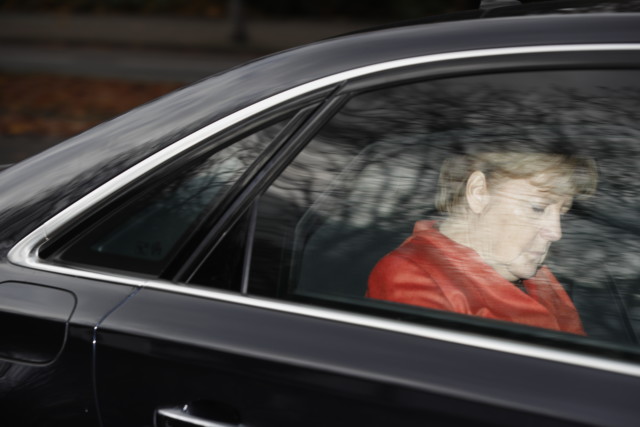Germany is facing a political crisis following the collapse of coalition talks. Chancellor Angela Merkel met with the German President Frank-Walter Steinmeier, to see if there was a way to salvage negotiations. The alternatives: a minority government or new elections.
Merkel now faces her biggest challenge in more than a decade. CGTN’s Natalie Carney has more from Berlin.
Follow Natalie Carney on Twitter @NatalieCarney77
Chancellor Merkel emerged from talks with the German President after only half an hour. The main take away was to continue to look for a solution.
“All political parties that have been voted into the German parliament are committed to the public interest. They serve our country. I expect all of them to be ready to talk to try to form a government in the near future,” the president said.
Thoughts of another election are dashed, at least until all possible options are explored. Even before the September election results were counted, there were talks of forming a Jamaican coalition.
Jamaica was discussed because the colors of the party’s involved. The Greens, Christian Democratic Union (CDU) and Freedom Democratic Party (i.e. Green, Black and Yellow) make up the same colors as the Jamaican flag.
Yet on Monday, that flag was flying at half-mast, following the announcement that the pro-business Free Democrats (FDP) were backing out of talks.
“As Free Democrats, we have made various compromise offers during the last weeks, namely tax policies, European policies, questions of migration and education, because we know that politics lives from balancing and with just 11 percent one cannot dictate the course of an entire Republic,” Christian Lindner of the FDP said.
Merkel is now acknowledging that the weeks ahead will be “difficult.” The country’s second largest party, the Social Democrats have again ruled out another coalition government with the CDU.
All parties have refused to partner with the far-right nationalist Alternative for Deutschland (AFD), who campaigned on an anti-euro, anti-immigrant platform winning 94 out of 709 parliamentary seats in September’s election.
It’s been more than seven decades since members of a far-right party have walked the halls of the German parliament. Yet, vivid memories of those times continue to haunt many, making the presence of a party referred to as “Nazis” even more disturbing.
Many are concerned about what new elections might mean for the AFD, amongst voters who have now lost further faith in the chancellor.
“The AFD have no body to enter coalition with in the German parliament, so it might be that its impact is minor in the political pragmatic sense. On the other hand, they might see procedural rules, and try to block the parliament and its progress and that might have a long lasting effect,” Prof. Boris Vormann of Bard College Berlin explained.
Merkel has said she’d rather have elections than try to form a minority government with the Greens, or even the left-wing populist party Die Linke. Her center-right CDU is feeling the pressure of her dismayed support base, as a result of her increasingly left-leaning policies.
The German president will meet with all parties over the next few days in an effort to find a solution.
 CGTN America
CGTN America German Chancellor Angela Merkel leaves in her car the presidential residence Bellevue Castle in Berlin where she met the German President on November 20, 2017 after coalition talks failed overnight.
Chancellor Angela Merkel was left battling for political survival on November 20 after high-stakes talks to form a new government collapsed, plunging Germany into a crisis that could trigger fresh elections. / AFP PHOTO / Odd ANDERSEN
German Chancellor Angela Merkel leaves in her car the presidential residence Bellevue Castle in Berlin where she met the German President on November 20, 2017 after coalition talks failed overnight.
Chancellor Angela Merkel was left battling for political survival on November 20 after high-stakes talks to form a new government collapsed, plunging Germany into a crisis that could trigger fresh elections. / AFP PHOTO / Odd ANDERSEN
